- From Faith Current: “The Sacred Ordinary: St. Peter’s Church Hall” - May 1, 2023
- A brief (?) hiatus - April 22, 2023
- Something Happened - March 6, 2023
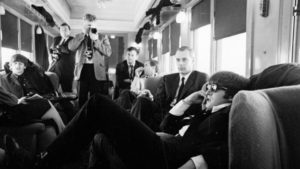
A room and a room and a car and a room: At least this room has wheels.
Well, I finally went to see the much-anticipated Eight Days A Week last night at 10:00 in the p.m. Why so late? Because I’ve been working eight days, etc etc.
I know the story, backwards and forwards, and so do you. So going in, I expected nothing, especially after reading Nancy’s review which suggested a surface take. And a surface take it was indeed — but I loved it. I think you should see it; in fact, I think every serious Beatles fan should see it. Here’s why: there is so much new footage, and it is so eye-poppingly pristine, that Eight Days A Week conveys a tremendous amount of excitement in spite of its apparent desire to be the most inoffensive Beatles film ever made. Eight Days A Week makes A Hard Day’s Night feel like a gritty exposé.
This is a very Hollywood picture. That’s what it wants to be, and that’s what it is — which means that very little of the reality of touring comes through. As Nancy said, sex and drugs are hardly mentioned, and as I said, that makes the narrative so polite as to be a trip through Pepperland. Nothing the least bit controversial is mentioned, even when it is utterly central to the topic at hand: Brian’s “paper bag money,” for example. And even when there is a revealing tidbit within easy reach, the movie seems go to some lengths to avoid it; the Washington embassy party is mentioned, but not Ringo’s storming out after someone tried to cut his hair. What could be a better example of how people didn’t treat the Beatles as human beings, even in February 1964? How the adulation was utterly conditional, and had an undercurrent of children mistreating their toys from the very first scream?
This staying on the sunny side makes everything feel somewhat nebulous and unmotivated. Dark and grimy Hamburg, the inescapable wellspring of the Beatles’ magic, is dismissed in three minutes and a silhouette of a stripper. How did the Beatles become so wonderful, so magnetic onstage? Not asked, so not answered. The Litherland Town Hall gig — supposedly the first time The Beatles were THE BEATLES — isn’t mentioned; the Royal Command performance isn’t shown; and so forth. Eight Days A Week is really about American Beatlemania, and the Boomers who still remember it fondly. Anything else just can’t keep this film’s attention.
If you didn’t know that the Fabs’ very nearly didn’t make it out of Manila alive — in other words, if you hadn’t already watched Compleat Beatles and Anthology — you won’t learn it from Eight Days A Week. Mal Evans, the heart and soul of the Beatles’ touring experience, is barely mentioned. Instead, we learn that Sigourney Weaver spent a lot of time picking out her dress for the Hollywood Bowl concert.
All this isn’t simply marketing, though some of it surely is; rather, it’s the result of a conscious decision from the jump to let moving images have pride of place. This inevitably skews the documentary towards what can be seen, and what looks best. Nobody sat Mal down with a film crew, to talk about the Beatles’ Satyricon (Lennon’s description, which is burned into the brain of every serious Beatlefan, is not repeated here). There is a peculiar pulling away from anything that might disturb a preteen; not just the conspicuous lack of sex (marijuana is referenced briefly, and never by name), but also anecdotes like the famous “Beatles, women and children first” flight, Jeanne Dixon’s rumored prediction, and Brian’s deterioration in ’66. The closest Eight Days A Week gets to any of this is a roadie talking about the possibility of electrocution in St. Louis in 1966.
But while this makes Eight Days A Week suitable viewing for your Beatles-mad seven year old, it precludes any deeper understanding of what touring was really like for them. Everything but the Beatles themselves is lacking in color. Their decision to stop, for example, comes across as a bit feckless — like they were merely fed up, restless — when in fact we know that it was a desperate grab for their sanity. And the film misses a real opportunity for drama by not emphasizing how, in 1966, pop groups that didn’t tour were essentially defunct, so the stakes in this decision couldn’t have been higher — and informed McCartney’s gambit to remake them into Sgt. Pepper’s band. Nor does it explicitly mention that “Get Back” was an attempt to relight the group’s internal spark via live performance; that’s how essential playing live felt to the Beatles themselves. Or how that attempt foundered in part because they couldn’t figure out how to bring the post-Pepper Beatles music alive onstage. This sets up such a wonderful point: that the Beatles’ relentless genius slowly but inexorably weaned them away from what kept them growing together as a unit. In this reading, not John’s heroin or Yoko or Klein broke them up — they simply got too good. Interesting thought.
The interview material — even that provided by the Beatles themselves (new interviews with Paul and Ringo, Anthology-era stuff from George and Neil, older stuff from John) is pleasant and inessential. The celebrity interviews from Whoopi Goldberg and Sigourney Weaver are nice enough, but only notable because the speakers are Famous People. There is only the vaguest attempt to locate the experience in a larger historical context, and no analysis to speak of. The film’s vaunted examination of the Beatles’ internal workings really comes down to Paul’s “all decisions were unanimous” post-lawsuit talking point, and a bit about only having an hour and half in Studio Two, from 10:30 am to noon, so that made for greater discipline.
But Eight Days A Week works, by God, and it’s another testament to the amazing alchemy of John, Paul, George and Ringo. It is a doggedly conventional portrait of four great eccentrics. They are mesmerizing onscreen, and their songs are, well, the greatest art of the 20th Century. Taking the film on its own image-over-substance terms, my only serious quibble was with the lack of context — I longed to see a map of any of the tours, showing distances traveled over how many days; I chafed when they mixed chronology in the photos; I chafed further when I knew a fact that would’ve hammered the point home. There has to be a space between trainspottery tidbits like knowing that the crowd noise that begins Pepper comes from “Beyond the Fringe,” and watching well-groomed and mainstream Boomer celebs enthuse over what it was like to scream at the Beatles.
All that having been said, it was the quickest two hours and twenty-five minutes I’ve spent all year, and when the Shea featurette faded out I was truly sad to see it end. Because there were the guys, in living color as they used to say, doing what they did best. The music sounds great, the band looks great. Whatever else it may be, Eight Days a Week is a reminder that, for a brief moment, the West was welded together in appreciation of something genuinely harmless and wonderful. Last night I was depressed by the debate, as who wouldn’t be… but a world that allows Beatlemania to happen, well, it can’t be all bad, can it?

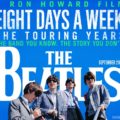
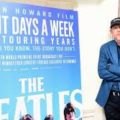
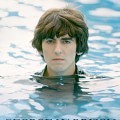
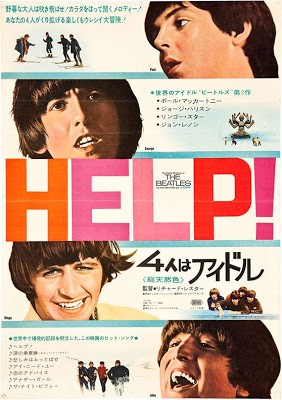
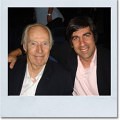
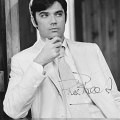
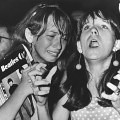


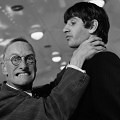
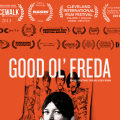
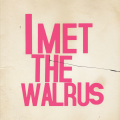
“Nobody sat Mal down with a film crew…” Did I read you correctly? Did you mean “nobody, at any time” or “these jerkoffs”? Because as you must know, Mal committed suicide by cop, which is now restricted to black men, after being thrown on the trash heap by the four dudes he gave his life to, in the 70s.
@Sir, what I meant was that nobody, inside or outside of the Beatles family, ever sat Mal down for interviews, filmed or not. (Was he interviewed for “The Long And Winding Road” project?) And yes, I well recall Mal’s sorry end. I also remember that he was supposedly working on a book, based on his diaries — which I suspect were given a good once-over before being sold to the public.
I think the Beatles treated people a lot better after John died, and Peter Brown showed them that it was much better to have someone “inside the tent pissing out,” in LBJ’s memorable phrase.
Mike, I think you put it well when you said that this is a film about Beatlemania in the U.S. And taken in that way, its upbeat quality seems to me to capture the kind of innocence that Devin describes in his account of the first U.S. tour in “Magic Circles.” It’s absolutely true that the film stays away from the dark side of events — but it conveys the sheer excitement of the time in a way I haven’t seen before. I see it as one aspect of the Beatles’ 12-sided die.
Also, I don’t know if McCartney’s talking about the unanimity of decisions is just “post-lawsuit” talking points. From what I’ve read, it seems to be true that the whole band had to agree to decisions pre-Klein.
Overall what the film suggests to me is the impossibility of covering the whole Beatles story in a film. There’s too much light, too much darkness, too much that isn’t cinematic. All you can capture is glimpses from various angles.
And finally: wasn’t the end of the Shea concert, “I’m Down,” great? Between John and George playing off each other and McCartney losing his mind singing, it was a reminder that even under tough conditions they could still have a great time. Loved the way John was playing the keyboard with his elbow toward the end.
Nancy, I’ve always LOVED that performance of “I’m Down.” And I think that, in general, they enjoyed the heck out of each other’s company.
I’m not dismissing Paul’s talking point — I’m not saying he was fudging — I’m only saying that he only started saying that (a LOT) after 1971. After Lennon Remembers, and the lawsuit, made it an issue.
An interesting question is: who says American Beatlemania was “innocent”? I know that’s the conventional take, but is it right? And what do you think people mean when they say that?
You mentioned the lack of a map or chronology of their tour schedule — I happened to note as I was watching that they played Amsterdam on June 4 (don’t remember the year, I want to say 1965) and Hong Kong on June 8, four days later. Love Brian Epstein and all, but what kind of a mad man would set up a tour where you’re hopping from Amsterdam to Hong Kong in four days, with stops no doubt in between. That’s insane. By the end of it, the Beatles must have felt like sleep-deprived, drug-addled POW’s.
.
I suspect that the three-month break at the beginning of 1966, when their third film didn’t happen, must have reminded them what sanity felt like. The contrast between that and the worst stretch of touring of their career — Manila and the “Bigger than Jesus” American tour — must have been stark. No wonder they stopped.
That’s a really good point, @MM. A taste of “normal” life, then that hellish ’66 tour.
I think, though, if Brian hadn’t died, they would’ve figured out a way to do it again. They simply progressed too fast, and got to the end of their rope before their industry solved the problems of touring on a Beatles scale.
they briefly cut to a screaming girl right after Paul’s “come on everybody, clap yer hands and stamp yer feet” , omitting John’s Igor routine. I don’t recall seeing that after 64 but he did that fascist speaking in tongues for a long while. Great G rated Beatles Movie, great footage.
Hopefully Tune in Vol 2 won’t hold back.
Richie, it’s not an “Igor” routine; it’s John’s cripple impression. And seeing that quick cutaway was the moment I realized, “Oh, this is going to be ruthlessly sanitized.”
IMHO, you can’t understand the Beatles without understanding their ruthlessness, and John’s meanness is the sacred headwaters of that. If they hadn’t been ruthless — selfish — cruel — it’s doubtful they would’ve been tough enough to make it. Certainly that’s what Lennon thought in retrospect, though it could’ve been simple guilty conscience on his part.
They did it twice, even! Once in the documentary proper, and also during the Shea recording (having not seen the original, I don’t know if that was an editing decision from the ’60s or a new edit). It makes me wince, because while I’m super uncomfortable with the bit, I’m almost more uncomfortable with them whitewashing it out of performance history. (It’s not like it was a one-off; they did it at what seems like a sizable number of shows).
Part of me wants to excuse it and say, “well, they’d have to include the whole Anthology bit explaining why he was doing it, and it wasn’t on theme for them” and then another part of me is like, “Well, the fact that caretakers used to ask the Beatles to touch people in wheelchairs, etc., as though it would heal them, is a PRETTY relevant example of Beatlemania at its most alarming!” So, that leaves us back with the idea that they just wanted to gloss over anything unsavory, regardless of how relevant.
Anyway, agree with all your critiques, Michael, but I too enjoyed the heck out of watching it anyway . . . the new (to me) press conference clips (“Well, we do the zest we can!”), and the abundance of performances were enough bang for my buck. (I also liked the cheesy little moving graphics of the album covers, so sue me. Heh heh.)
Yeah, the cripple impression was a standard bit of Lennon schtick for the entire mania period. And personally I don’t think it came from anywhere particularly profound — IMHO it wasn’t “commentary” spurred by the disabled people coming to be healed as much as Lennon’s teenaged gross-out humor. It’s a young man’s fascination with/fear of physical deformity, which you can see in his drawings, too. Lot of references to “spastics,” etc.
Here’s the problem with knowing the story backwards and forwards: we’re bound to be disappointed. I love learning and knowing and being a connoisseur. Unfortunately the more I know about a thing, the less I can be satisfied with any interpretation of it.
.
Here’s Ambrose Bierce:
.
CONNOISSEUR, n. A specialist who knows everything about something and nothing about anything else.
An old wine-bibber having been smashed in a railway collision, some wine was poured on his lips to revive him. “Pauillac, 1873,” he murmured and died.
.
When I first learned about Ron Howard’s project I immediately assumed it’d be a ninety-minute splash in shallow waters. Sure, I would have loved a deep dive into every hidden corner of the Beatles story. A nine-hour Beatles “Shoah”-like documentary presented by someone like Errol Morris or Werner Herzog (perhaps even narrated by Herzog!) but it was not to be.
.
So I bought my ticket determined to turn off the part of my brain that collects profound facts about scandals or sex or drugs or inside stories within inside stories. I wanted it to be a pure sensory experience. Color, sound, feeling, humor. There was a time when I would have fortified myself with cannabis, but since those days are over I used a sort of psychic muscle memory to let the movie wash over me in the same way.
.
I want to see it again, this time in a theater full of young people. I loved hearing the joy of the three senior citizens seated behind me during my first viewing (they giggled and murmured and sang along). I’d love to hear a packed audience of millennials reacting viscerally to it.
.
And I hope they all run out after the movie and buy Lewisohn’s books.
I do realize that. An Igor character, rather than an actual disabled person, was the first thing that came to mind thinking of his claw clapping. It was a juvenile shtick from a young man with serious issues and way more attention that he was prepared for.
But it was egged on by Paul literally as part of the act. Paul is goading a caged animal (an interesting artistic comment on Beatlemania), and he’s giving John rope to hang in himself with (showing Paul as the lovable and sensible leader). It’s so odd, and but so… them
I do think the thing was John’s instinctive artistic reaction to that much attention. The whole world is watching? What do you do? Ham it up like an exaggerated X (all the derogatory terms are unacceptable). The 12 year old in me can almost relate.
I have to assume Brian tolerated it, at least at first. No sure when it stopped. It’s intentional omission from the film was obvious.
The speaking in tongues was less offensive and perhaps could have been a G rated example of John’s instincts for performance art during the touring years.
Also, thinking about this I couldn’t help but think of Cripped Inside. Is that offensive today? Was it then? John seemed to eventually always get around to trying to make good, but on his own terms.
btw, love your blog.
A few months ago I saw a thread on Reddit with a title something like “Clip of John Lennon Mocking Retarded People”, which showed his standard “cripple” shtick. I can’t remember which concert, though it hardly matters since he did it a hundred times.
.
I was somewhat surprised by the comments, which were almost universally condemnatory. It’s helpful to remember that Reddit has a very young demographic, meaning those comments most likely came from teens and young adults. They have been raised in a very different culture, and in their world it is simply unacceptable to mock the disabled in the way John did. I can’t say they don’t have a point. When my dad was young, “Amos and Andy” was perfectly acceptable entertainment. Times change.
I think Lennon’s cripple routine came from the admittedly frightful way in which our society thought of the disabled until very recently, predating the Pontiff-like farcical healing routines they were forced to do, as well as the Goon Show and everything else. Unfortunately, we all thought like that 50 years ago when young. I’m ashamed to say “hey retard” was a really common greeting throughout my childhood. Had I seen Lennon’s impersonation when I was a middle schooler, I would have thought it was hilARiously well done.
I wish they HAD included his cripple routine, combined with a end-of-flick trailer that said “Dear Anti-Vaxxers: see that spastic shit Lennon was doing? That’s because the world was populated with polio victims until Jonas Salk came along. Notice any iron lungs now? There’s a fucking reason. Vaccinate your fucking kids, you stupid retards.” Or something to that effect.
As someone with cerebral palsy — now it can be told! — I’ve often wondered why John’s mocking of “spastics” (an old-fashioned term for people with CP) never really bothered me. I think perhaps it was because it was probably the least interesting thing about him. And totally typical of the humor of the time.
Lennon’s flaws — his meanness towards women and children and the disabled — are utterly boring; they are the only parts of his personality that isn’t his own invention. They are transparently a little boy’s attempt at fitting into what he perceives to be “hard man” masculinity. John Lennon could never do that, not really, and whenever he’s seen to try, it’s difficult to take seriously.
Not to say that the guy wasn’t a mean-ass drunk, and could be pretty distasteful when sober as well. But his sexism and bullying — well, they never strike me as quite REAL. As a fan I can indulge in that fantasy; but if I knew the guy, I wouldn’t be able to shrug it off so easily.
The cripple stuff strikes me as totally thoughtless and impersonal, like a teenager drawing pictures of freaks in the back of a study hall. That people are disapproving of it today is a good thing — but their outrage is just skin deep. It’s a desire for a certain appearance, not for things to be different. The internet culture of offense sometimes makes people mend their ways and correct their attitudes, but just as frequently I suspect it drives people to double-down. Shame is a very, very poor way to make someone change.
It was something more or less confined to the concerts, which were mayhem. urine in the aisles? it was certainly insensitive, but I take it more as him acting like a trained animal on stage, mocking himself more than anyone. a freak show.
I like this video. It’s an entirely different facet of the touring years. https://www.youtube.com/watch?v=6NErU1WTEUE
one nice bit from the film was Paul getting asked about their impact on Western culture. his response was very Beatley. oh no, thats enuufff lad. yoov gone to fah. yer daft you know. (paraphrasing)
That was one of my favorite bits, too. 🙂
“What place do you think the story of the Beatles will have in Western culture?”
“You must be kidding with that question. Culture. It’s not culture. It’s a good laugh.”
(I like it both because it’s great banter/snark from Paul, and also because in retrospect, it wasn’t a silly question at all. It works on so many levels, haha.)
Well said Michael. John was an almost prototypical mid century hero. Full of contradictions.
I watched half the movie again. It definitely had the tone of the Complete Beatles (which I watched 50 times in 1988). I think I will keep Hulu a little longer.
The Anfield fans singing she loves you was very cool. I love Mal turning the drum riser in Washington. So sad about Mal. I have such affection for all those home town folks. Neil, Frida, Brian
With so much to cover it’s inevitably frustrating. This film perfectly wet the appetite for Vol 2. Mark should have Interpol security or something.
I know it’s impossible, but I want to see the fire cracker going off on the stage in Memphis. I want to see them hanging around the pool in LA in 65 secretly tripping balls. I think the right team could make the Manila experience itself into a movie. I think getting stuck in the back of an armored car was escaping from Dodger Stadium, a couple days before Candlestick.
That said, I had never seen so much exposition on their refusal to play the segregated show. A great and undeniably positive angle.
And a nice shot of them with Fats Domino. I have thing for Nola. The fact that the boys only request their only time in Nola, was to meet Fats, is so cool to me.
“I know it’s impossible, but I want to see the fire cracker going off on the stage in Memphis. I want to see them hanging around the pool in LA in 65 secretly tripping balls. I think the right team could make the Manila experience itself into a movie.”
THIS is what I’m saying. If you know those stories, Eight Days A Week feels wan and thin. But on its own, it’s lovely.
I haven’t had the chance to see it yet. It was not released in my country. I appreciated your review very much. Of course we knew it would be for all ages. Ron Howard is a great movie director. But see what he did with John Forbes Nash. A Beautiful Mind is brilliant. But that is not the real Nash. Somehow it is sad he felt the need to avoid saying he had some gays affairs as if that is something not acceptable. For most it is still unacceptable, but Hollywood should have grown up. So, of course ” *8 Days a Week” would concentrate only in what everybody loves. But it is great to know it works so well. I hope I can see it somehow, Maybe it will arrive here soon. Who knows? But I still dream of an adult movie about The Beatles showing the dark side…with love and respect, of course.